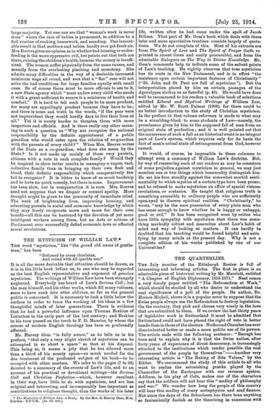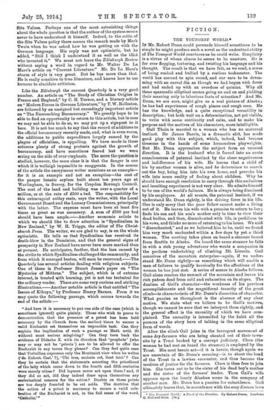THE QUARTERLIES.
THE July number of the Edinburgh Review is full of interesting and informing articles. The first in place is an admirable piece of historical writing by Mr. Marriott, entitled "A Chapter of English Diplomacy, 1853-1871." Next cornea a very timely paper entitled "The Referendum at Work," which should be studied by all who desire to understand the real significance of a poll of the people. Its author, Dr. Horace Micheli, shows it is a popular error to suppose that the Swiss people always use the Referendum to destroy legislation. On the contrary, they pick and choose very wisely in the laws that are submitted to them. If we review the last thirty years of legislative work in Switzerland it must be admitted that Switzerland could not have placed the right of veto in better bands than in those of the electors. No Second Chamberhas ever discriminated better or made a more politic use of its powers. The article ends with the following sentence : "Enough has been said to explain why it is that the Swiss nation, after forty years of experience of direct democracy, is increasingly attached to the institutions which render possible the real government of the people by themselves."—Another very interesting article is "The Rating of Site Values," by the Editor. We recommend the study of this article to all who want to realize the astonishing pranks played by the Chancellor of the Exchequer with our revenue system. Addison, in his play of Cato, makes one of the characters say that the soldiers will not bear this "medley of philosophy and war." We wonder how long the people of this country will bear this medley of crazy metaphysics and mad finance. Not since the days of the Schoolmen has there been anything so fantastically foolish as the theorizing in connexion with Site Values. Perhaps one of the most astonishing things about the whole question is that the author of the system seems never to have understood it himself. Indeed, to the critic of the Site Values policy there occurs the remark made by Mark Twain when he was asked how he was getting on with the German language. His reply was not optimistic, but he added, "Still I think I understand it as well as the idiot who invented it." We must not leave the Edinburgh Review without saying a word in regard to Mr. Walter De La Mare's article on "Current Literature." Mr. De La Mare's charm of style is very great. But he has more than that. He is really sensitive to true literature, ana knows how to use humour to elucidate criticism.
Like the Edinburgh the current Quarterly is a very. good number. An article on "The Study of Christian Origins in France and England," by C. H. Turner, and a literary article on" Modern Forces in German Literature," by T. W. Rolleston, are followed by an unsigned but exceedingly important article on " The Encroaching Bureaucracy." We greatly hope to be able to find an opportunity to return to this article, but in case we may not be able to do so, we may put up a signpost to it here. It is not too much to say that the record of additions to the official bureaucracy recently made, and, what is even worse, the additions to public expenditure largely caused by the plague of officialism, is appalling. We have made in these columns plenty of strong protests against the growth of bureaucracy, and have sometimes feared lest we were erring on the Bide of over-emphasis. The more the question is studied, however, the more clear it is that the danger is one which it is wellnigh impossible to exaggerate. In the course of the article the anonymous writer mentions as an example— for it is an example and not an exception—the cost of the pauper lunatic asylum built about ten years ago at Warlingham, in Surrey, for the Croydon Borough Council. The cost of the land and building was over a quarter of a million, or at the rate of 2500 a bed. The responsibility for this extravagant outlay rests, says the writer, with the Local Government Board and the Lunacy Commissioners, principally with the latter. The expense must have been at least five times as great as was necessary. A sum of 2100 per bed should have been ample.—Another economic article to which we should like to draw attention is "Syndicalism in New Zealand," by W. H. Triggs, the editor of The Christ- church. Press. The writer, we are glad to say, is on the whole optimistic. He tells us that Syndicalism has received its death-blow in the Dominion, and that the general signs of prosperity in New Zealand have never been more marked than at present. He anticipates, further, that the loss caused by the strike to which Syndicalism challenged the community, and from which it emerged beaten, will soon be recovered.—The Quarterly has several articles dealing with religious subjects. One of these is Professor Stuart Jones's paper on "The Mysteries of Mithras." The subject, which is of extreme interest, is treated with learning, yet is not too technical for the ordinary reader. There are some very curious and striking illustrations.—Another notable article is that entitled" The Issues of Kikuyu," by Professor Emery Barnes. From it we may quote the following passage, which occurs towards the end of the article :—
"And here it is necessary to put one side of the ease (which is sometimes ignored) quite plainly. Those who wish to prove to demonstration that the presence of a priest has been held necessary by the Church from tho earliest times to secure a valid Eucharist set themselves an impossible task. Can they explain the implication of such a passage as Matt. avid. 20 without most serious misgiving ? Can they turn back the evidence of Didache X. with its direction that 'prophets' (who may or may not be ' priests ') are to be allowed to offer the Eucharist in any terms they please? Can they feel quite sure that Tertullian expresses only the Montanist view when he writes (' de Exhort. Cast.' 7), 'Mai tres, ecclesia est, licet laid'? Can they be certain that the statements asserting the priesthood of the laity which occur down to the fourth and fifth centuries were merely otiose ? Did laymen never act upon them ? and, if they did so act, did they indeed draw upon themselves any ecclesiastical censure for the action ? Doubts on these points are too deeply founded to be set aside. The doctrine that the action of a priest is necessary to secure a valid cele- bration of the Eucharist is not, in the full sense of the word, 'Catholic."







































 Previous page
Previous page